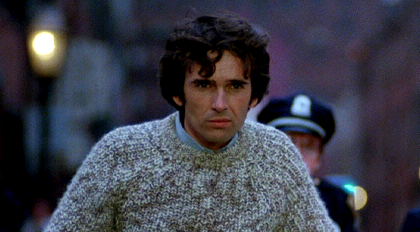Director: Kenneth Hughes
Writer: Ruth Avergon
Producers: Ruth Avergon, Larry Babb
Cast: Leonard Mann, Rachel Ward, Drew Snyder, Joseph R. Sicari, Karen MacDonald, Annette Miller, Nicholas Cairis, Bill McCann, Margo Skinner, Holly Hardman, Elizabeth Barnitz, Leonard Corman, Belle McDonald, Meb Boden, John Blood, Ed Chalmers, Ed Higgins, William McDonald, Kevin Fennessy, Lisa Allee, Patricia Pellows, Elizabeth Alice, Ted Duncan, J.J. Wright, Patricia Pellows, Patricia Rust, Jane-Leah Bedrick, Wally Hooper, Jr., Kevin King, Nancy Rothman
In Boston, Massachusetts, women are being decapitated. Homicide Lieutenant Judd Austin (Leonard Mann) notices the killer’s strange habit of depositing the victims’ severed heads in water. Since some of the victims were attending night classes at Wendell College, Lt. Austin concentrates most of his inquiries on the school’s faculty and students.
The Flashback Fanatic movie review
Unlike most slasher films of this era, Night School’s narrative focus is not on a teenage or young adult cast. While the killer’s targets are often young women, we are usually dealing with the investigation of the homicide detective and the concerns of Wendell College faculty members. This film does not use the typical youth-centric social dynamic many slasher films had with a young cast indulging in partying and sex until a killer picks them off.
Leonard Mann stars as our hero, Lt. Judd Austin. Initially, this character seems rather bland, yet I have come to appreciate that he is not an attention-getting badass or world-weary cynic. He is never trying to be an intimidating, macho showoff, but he can be intrusive and direct with those he needs answers from. Apparently, Austin is idealistic in using his education for public service and is dedicated to solving this macabre case. He is Harvard-educated and approaches his job with more intellectual insight than his Armenian partner Taj (Joseph R. Sicari), who believes a good cop just needs a good pair of shoes. Yet Austin is not dazzling us with Sherlockian deductions; he is just following hunches.
English model-turned-actress Rachel Ward makes her feature film-starring debut in Night School as Eleanor Adjai, an exchange student and research assistant for Professor of Anthropology Vincent Millett at Wendell College. Some have criticized her performance in this early role as wooden, but I think she is fine here. Ward displays some moments of emotional turmoil that deserve our sympathy. It could be argued that at one point she could be more agitated or hysterical. However, the more we learn about her character, the more sense it makes that she tries to be a contained person, despite the stresses she is dealing with.
Her major stressor is her lover, Vincent Millett (Drew Snyder), the womanizing teacher at the women’s college. This scholarly scumbag sure has his pick of the nubile bodies in the student body. Millett has had multiple affairs with his pupils and can’t stop flirting right under Eleanor’s beautiful nose. To Snyder’s credit, sometimes his character doesn’t comes across like a complete asshole, but we can never trust him. Millett really needs a refresher course in impulse control.
The motorcyclist mystery killer has the distinctive, identity-concealing getup of black leather cycling outfit and helmet. The killer also wields an equally distinctive weapon. That nasty accessory is a kukri, which certainly seems like a suitable blade for beheading.
While slasher films were often criticized as misogynistic, there were plenty of women involved in their production. In the case of Night School, Ruth Avergon was one of the producers and wrote the script. She brings some female concerns to the film and also contrived a radical set of family values that motivate the killer.
Another distinction that Night School has is slick and accomplished execution with the filmmaking fundamentals that are often taken for granted, but can really add a bit of polish to a genre film without drawing attention to themselves. In his final film, English director Kenneth Hughes’ long career of experience rises to the challenge of suspenseful teases leading up to the kills and reveals of their aftermath. Cinematographer Mark Irwin worked on a lot of David Cronenberg’s great sci-fi horror movies. Irwin’s shots that open the film, establishing its gloomy Boston setting, combine with the score to raise our anticipation for the upcoming atrocities. Composer Brad Fiedel provides a nice theme that is eerie and melancholy. It is perfect for the subject matter and the killer’s mindset.
There is a final scene meant to be the you-think-it's-over-but-it's-not gimmick that some of the most notable fright flicks of the era had done. I have read that it is a scene tacked on after the principal photography had wrapped. I think the film would have worked better without it to end on its original somber and unsettling note.
Released at the height of slasher mania, Night School has a slightly different approach and attitude, while still delivering the mystery killer intrigue and stalk-and-kill situations that define the genre. As usual, the critical reception at the time was as dismissive of it as with all other films in this nasty niche, but it has earned more respect by those reminiscing on the early ’80s heyday of the slasher film.















No comments:
Post a Comment